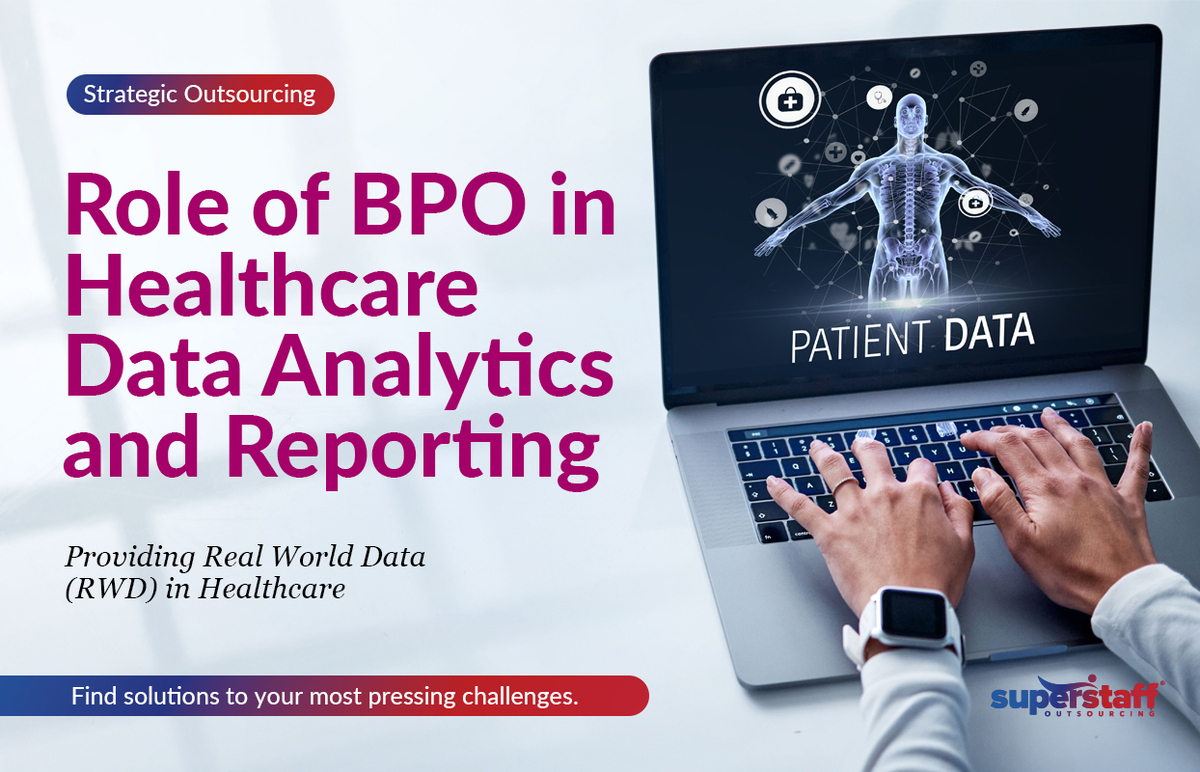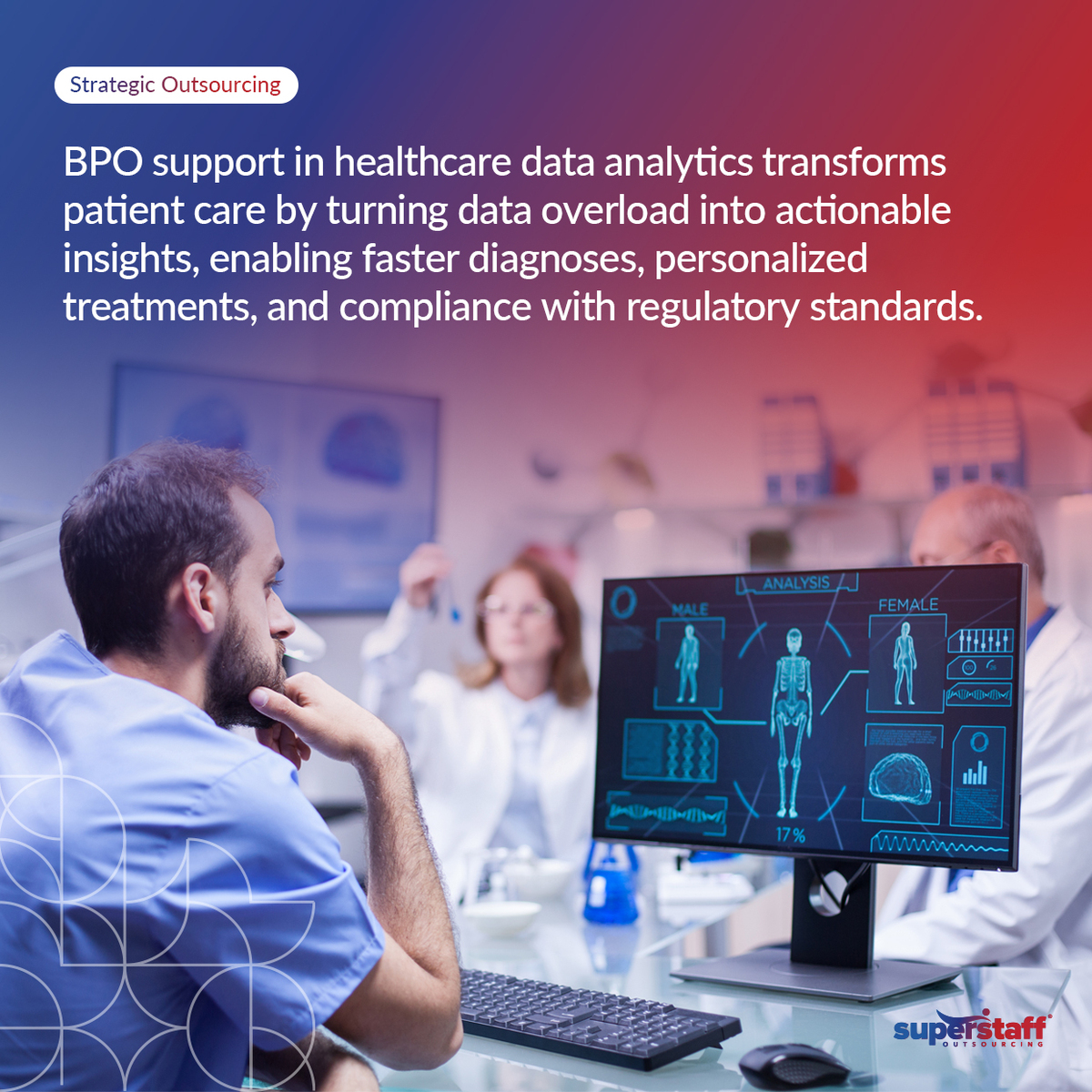
The healthcare industry is rapidly evolving, driven by the increasing availability of real-world data (RWD). This data from electronic health records, patient registries, and other real-life sources offers immense potential for improving patient care and operational efficiency.
As healthcare organizations strive to derive actionable insights from RWD, the complexity of managing and analyzing this data grows. This is where business process outsourcing (BPO) emerges as a critical partner. By leveraging specialized expertise, advanced technology, and scalable solutions, BPO providers play a transformative role in streamlining healthcare data analytics and reporting.
In this article, we explore how BPO can optimize the handling of RWD to enhance healthcare outcomes through efficient, insightful analytics and reporting.
The Challenges of Processing and Analyzing Large RWD Datasets
Analyzing real-world data (RWD) requires meticulous attention, unwavering accuracy, and adherence to high-quality standards. However, processing presents significant challenges that healthcare organizations must navigate to fully harness their potential.
One of the primary challenges is ensuring accurate data entry and management. According to McKinsey, healthcare datasets are often structured for administrative and billing purposes, leading to potential inconsistencies and biases.
Those biases can distort the interpretation and analysis of data, ultimately hindering healthcare processes and the reliability of data reports. Additionally, due to the complexity of RWD, conducting a comprehensive evaluation is time-intensive and can become costly for healthcare organizations.
Another key challenge is quality control. Ensuring the accuracy and reliability of data is critical to maintaining quality and can directly impact a healthcare organization’s performance. Studies by the National Center for Biotechnology Information (NCBI) suggest that one of the crucial steps to assuring RWD quality is evaluating clinical data, laboratory results, and consistency across patient records. Maintaining data quality is as intricate and demanding as managing the data itself.
Beyond data management and quality control, analyzing large RWD datasets requires specialized expertise and cutting-edge technology. Skilled data scientists and analysts are essential to transforming raw datasets into actionable insights through their computer science and data analytics expertise. However, many healthcare providers face limitations when handling such extensive data in-house, as the scale and complexity of the task can be overwhelming.
Understanding these challenges highlights the value of BPO partnerships. By leveraging BPO, healthcare organizations can alleviate the burdens associated with RWD management and analysis, optimize their data analytics processes, and enhance outcomes.
The Role of BPO in Healthcare Data Analytics

BPO companies bring expertise and specialized skills to meet healthcare data analytics needs. These services range from data entry and management to advanced predictive analytics, ensuring that sensitive healthcare data is handled efficiently and thoroughly compliant with regulatory standards.
Types of Data Analytics Services Offered by BPOs
BPO companies provide a wide array of data analytics services, each designed to ensure comprehensive and accurate data analysis:
- Data Entry and Management: Involves recording and updating medical information and databases, either manually or through automated systems. It is a foundational step in ensuring that healthcare data is correctly structured for future analysis.
- Data Collection and Cleaning: After data is recorded, it must be transformed into reliable, usable information. Data collection and cleaning involve standardizing and refining this data to ensure accuracy and relevance to healthcare needs.
- Data Mining: Data mining uses advanced analytical models to uncover hidden patterns and trends within datasets. Healthcare organizations can make informed decisions based on valuable insights by predicting future trends.
- Quality Control: Quality control specialists ensure that all extracted data meets the healthcare firm’s quality standards. This step ensures the data aligns with organizational goals and supports sound decision-making.
- Predictive Analytics: Predictive analytics leverages current and historical data to forecast future outcomes. This advanced model helps healthcare organizations anticipate trends and optimize strategies based on actionable insights.
The Value of Expertise in Handling Sensitive Healthcare Data
Healthcare data is critical for any healthcare organization, driving improvements in care delivery and patient experiences. However, managing such sensitive and complex data requires high expertise. Studies indicate that much healthcare data remains underutilized, introducing vulnerabilities when left unattended.
To underscore the risks, a report by IBM reveals that healthcare data breach costs have surged by 53.3% since 2020, reaching an average of $10.93 million per breach. This statistic highlights the need for professional expertise in managing healthcare data to safeguard against potential breaches and inefficiencies.
BPO firms are uniquely positioned to address these challenges by offering skilled data processing and analytics solutions. This allows healthcare providers to focus on their core functions while ensuring their data is secure, well-managed, and fully utilized. Healthcare is an industry that stands to benefit significantly from the expertise of data scientists, who are adept at managing complex datasets, using sophisticated analytics tools, and applying models like comparative analysis. By partnering with BPOs, healthcare organizations can safeguard sensitive real-world data and improve operational efficiency.
BPO’s Role in Ensuring Compliance With Regulatory Standards
Healthcare organizations must navigate a complex landscape of regulatory standards set by bodies such as HIPAA, GDPR, and the FDA. These regulations are critical for protecting patient privacy and ensuring data security. For example, HIPAA mandates that patients have the right to make informed decisions about how, when, and where their medical information is used. Personal details like names and addresses must remain confidential at all times.
Similarly, the GDPR requires healthcare firms to obtain explicit patient consent before using their data. This promotes transparency and gives patients control over their personal information, safeguarding privacy and ensuring compliance with regulatory frameworks.
However, keeping up with the ever-evolving regulatory landscape can significantly challenge healthcare organizations. BPO firms are essential in helping healthcare providers stay current with these changes, ensuring compliance is consistently met and updated as regulations evolve.
Moreover, regulatory changes can benefit healthcare organizations. For instance, the FDA’s Breakthrough Therapy designation accelerates reviewing and developing medications for life-threatening conditions. This has empowered pharmaceutical companies to leverage real-world data (RWD) to understand drug safety and efficacy better.
BPO firms continuously monitor these regulatory standards, adapting to changes and implementing new models as they arise. By partnering with a BPO, healthcare organizations can ensure that their data analytics and compliance processes remain aligned with shifting regulatory requirements.
Now, let’s examine how BPO enhances healthcare data reporting processes.
Enhancing Data Reporting in Healthcare Through BPO
Accurate and timely data reporting is crucial for healthcare organizations and pivotal in compliance and decision-making processes. BPO firms streamline the data reporting process, ensuring precision while meeting tight deadlines.
Let’s explore how BPO enhances this critical aspect of healthcare operations.
How BPOs Ensure the Accuracy and Reliability of Healthcare Data Reports
The volume of healthcare data continues to grow exponentially, making it one of the top five industries relying on data science to optimize operations. As data becomes more integral to medical workflows, the importance of data accuracy and quality intensifies. Poor data quality can significantly disrupt patient care and undermine healthcare outcomes.
Data reporting is often time-consuming, bound by tight deadlines and regulatory requirements. The complexity of managing healthcare data reports can lead to errors, which can have far-reaching consequences.
BPO firms, with their specialized expertise, ensure that healthcare data reports are accurate, reducing mistakes and improving the overall data quality. By streamlining this process, BPOs help healthcare providers deliver reports on time while maintaining high standards of accuracy.
Customization of Reports Based on Organizational Needs
As noted in a National Center for Biotechnology Information (NCBI) study, healthcare data was once treated as a “one size fits all” solution. This rigid approach led to inefficiencies, with healthcare providers struggling to adapt to linear data structures. As a result, valuable data often went unused, limiting the effectiveness of healthcare systems.
Today, BPO firms recognize that medical data must be tailored to the unique needs of each patient and healthcare organization. They offer customized, scalable solutions that adapt to the specific requirements of each provider, ensuring that data reporting aligns with operational goals. BPOs can also respond swiftly to seasonal spikes, providing the flexibility to meet fluctuating demands.
By delivering accurate, timely, and customized data reports, BPO firms contribute to long-term improvements in healthcare operations.
Next, let’s explore how BPO partnerships can drive sustained growth and efficiency for your healthcare organization.
The Integration of AI and Automation in BPO Healthcare Services

AI and automation have rapidly become integral to healthcare BPOs, offering transformative benefits. As Forbes reports, artificial intelligence (AI) and machine learning are revolutionizing real-world data (RWD) analytics, revealing patterns and trends that human analysts might overlook.
A prime example of AI’s growing influence is Dandelion Health’s recent announcement to incorporate AI into GLP-1 drug research. This integration empowers researchers and medical professionals to uncover significant insights, potentially revolutionizing clinical trials and medical research. AI in these areas demonstrates the technology’s potential to improve healthcare outcomes and streamline research processes.
BPO firms are well-positioned to adopt cutting-edge technologies such as AI and machine learning, staying at the forefront of industry advancements. Healthcare organizations can seamlessly integrate these advanced tools into their operations by leveraging outsourced data scientists and experts, enhancing data analysis and operational efficiency.
The Evolving Relationship Between Healthcare Providers and BPOs
The demand for real-world evidence (RWE) is growing rapidly, driven by the increased use of RWD in healthcare decision-making.
According to industry reports, the global RWE market will reach $4.5 billion by 2029. This reflects two important trends: the increasing reliance on RWD by healthcare providers and the significant opportunities RWD integration offers healthcare firms. However, managing the complexities of RWD often stretches the limits of in-house teams.
In response, BPO firms have evolved beyond traditional back-office and customer service roles to offer specialized solutions that address the growing data needs of healthcare providers. While customer support and administrative services remain essential, BPOs now deliver sophisticated data analytics, regulatory compliance, and AI-driven solutions tailored to healthcare organizations.
As healthcare providers face changing trends and increasing demands, BPO firms are equipped to provide the expertise and tools needed to meet these challenges. By partnering with BPOs, healthcare organizations can stay competitive, become more data-driven, and achieve sustained growth.
Transform Your Healthcare Data Analytics
Real-world data (RWD) datasets offer significant benefits but also present challenges, such as complexity, increasing demand, the need for high-quality standards, and regulatory compliance. BPO providers are critical in addressing these challenges by offering specialized expertise in data analysis, handling sensitive medical information with care, and staying ahead of technological advancements and industry trends.
At SuperStaff, we are an experienced BPO firm dedicated to optimizing healthcare data analytics. We equip our professionals with cutting-edge tools to ensure precision, efficiency, and compliance. Partner with SuperStaff today, and let us handle your RWD processing needs while helping you enhance healthcare outcomes.






